This article explains the meaning of ten Christmas Bible verses to help you understand the biblical significance of the holiday season.
As the Christmas season fills our hearts with joy and anticipation, exploring the biblical foundations of this sacred holiday can deepen our celebration and understanding. In this article, we delve into key Bible verses that capture the essence of Christ’s birth, offering you thoughtful interpretations and insights. Whether you’re preparing a sermon, writing a holiday card, or simply seeking spiritual enrichment, the following scriptures will illuminate the true meaning of Christmas.
Isaiah 7:14 – “Therefore the Lord Himself Will Give You a Sign: The Virgin Will Conceive and Give Birth to a Son, and Will Call Him Immanuel.”
This verse from Isaiah is a profound prophecy that foretells the miraculous birth of Jesus Christ. Here are key points to understand its significance:
- It’s a sign of divine intervention. God Himself promises a miracle, emphasizing His direct involvement in human history.
- The virgin birth is crucial. It underscores the purity and divine origin of Jesus, setting Him apart as uniquely capable of fulfilling God’s plan for salvation.
- The name “Immanuel” means “God with us.” This highlights the intimate relationship between God and humanity, showing that Jesus’ birth brings God into our midst in a very personal way.
This verse sets a foundation for the expectation of the Messiah in the Old Testament, paving the way for the New Testament fulfillment. It invites us to recognize Jesus as the promised deliverer who brings God’s presence into our lives.
Matthew 1:21 – “She Will Give Birth to a Son, and You Are to Give Him the Name Jesus, Because He Will Save His People From Their Sins.”
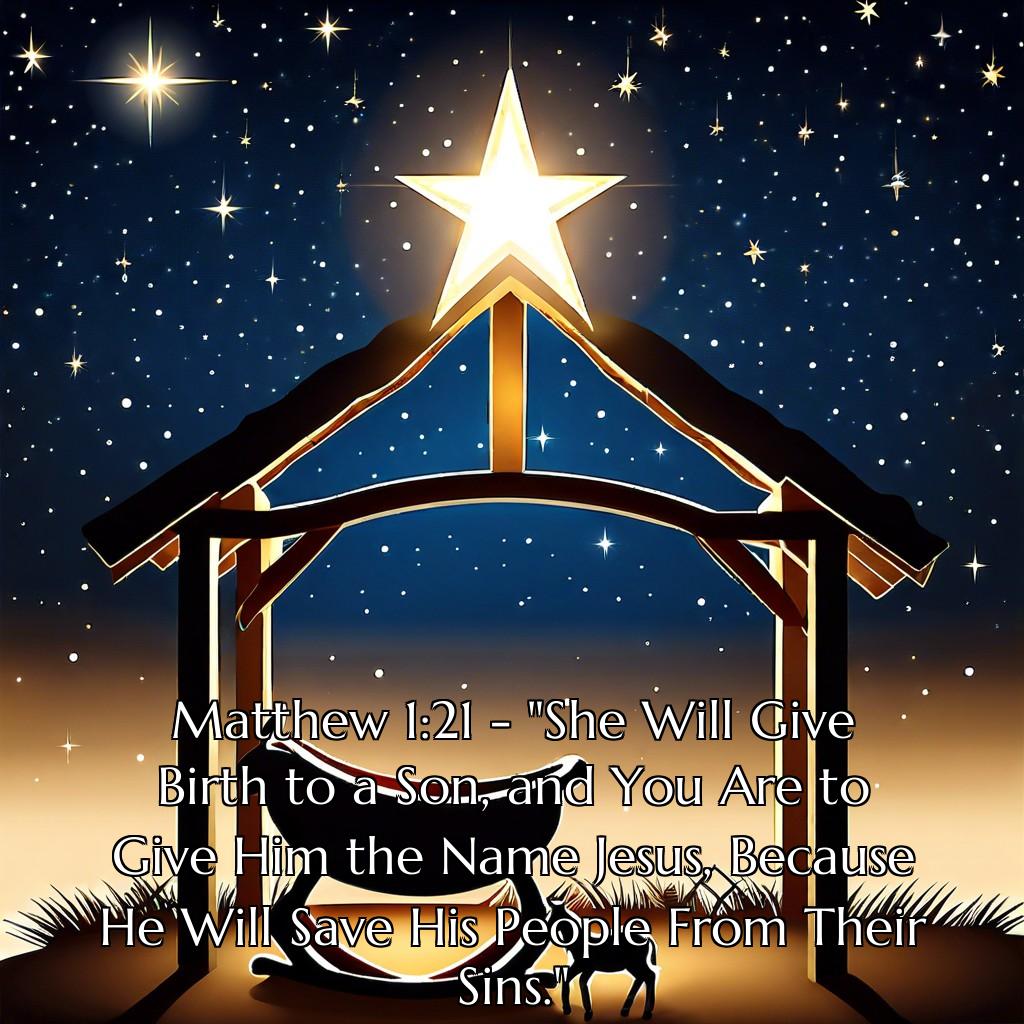
The verse emphasizes the significance of Jesus’s name, meaning “The Lord saves.” It underscores His mission to save humanity from sin.
- Key concepts:
- Divine Purpose: Jesus’s birth was part of God’s plan to redeem humanity.
- Name’s Meaning: In Hebrew, “Jesus” (Yeshua) directly translates to “The Lord saves,” highlighting His role as Savior.
- Fulfillment of Prophecy: This verse ties to Old Testament predictions of a Messiah who would bring salvation.
It’s a profound reminder of the hope and redemption that Christmas celebrates.
Luke 2:10–11 – “But the Angel Said to Them, ‘Do Not Be Afraid. I Bring You Good News That Will Cause Great Joy for All the People. Today in the Town of David a Savior Has Been Born to You; He Is the Messiah, the Lord.'”
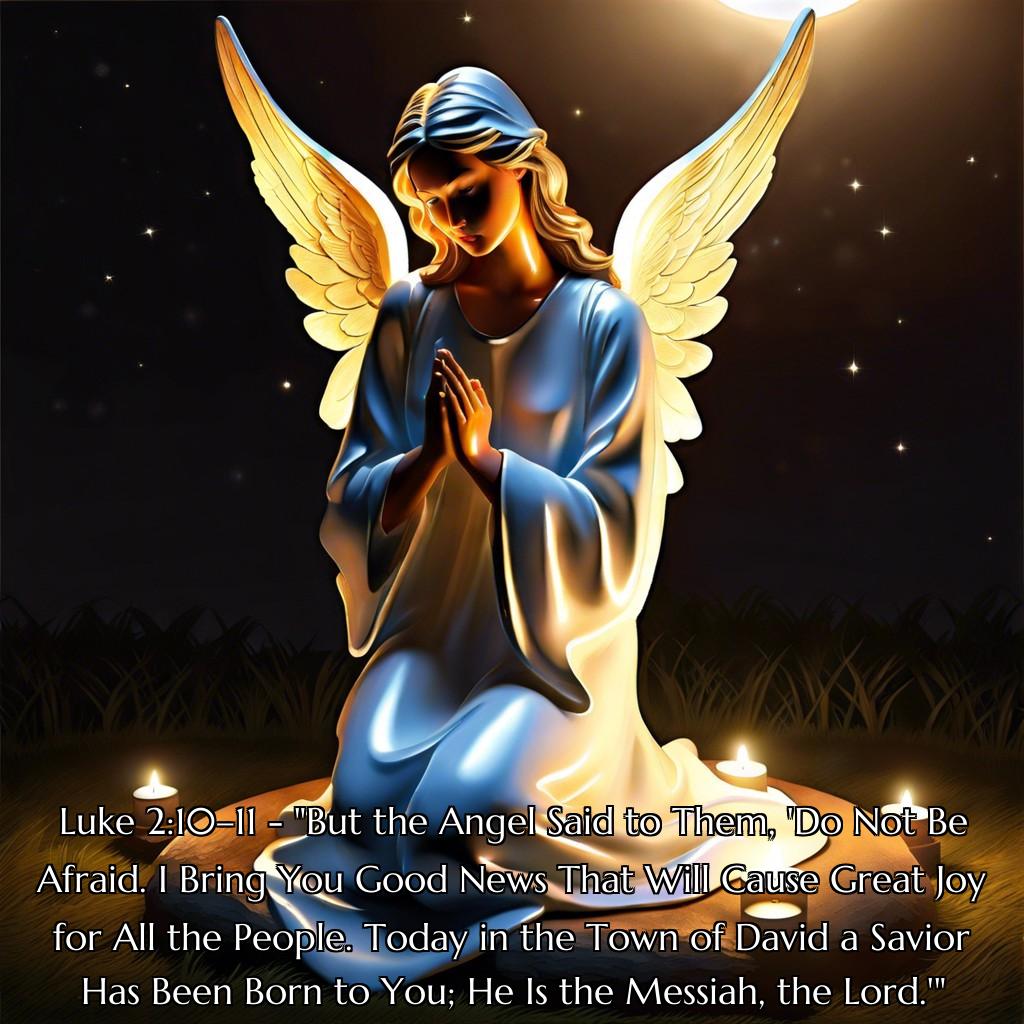
The angel’s message to the shepherds in this verse is packed with meaning and promise.
Firstly, “Do not be afraid” is significant. The appearance of an angel would naturally be startling, but the reassurance of peace sets the tone for the news to come.
“Good news” is a key phrase here. It’s not just good news for the moment; it’s transformative, affecting all humanity.
“Great joy for all the people” emphasizes inclusivity. This birth isn’t just for a chosen few but for everyone, breaking down barriers of race, class, and status.
The titles “Savior,” “Messiah,” and “Lord” highlight Jesus’ roles. Savior implies deliverance from sin, Messiah signifies the fulfillment of prophecies, and Lord denotes authority.
Finally, “the town of David” connects Jesus to King David’s lineage, fulfilling Old Testament prophecies and establishing Jesus’ rightful place in biblical history.
John 1:14 – “The Word Became Flesh and Made His Dwelling Among Us. We Have Seen His Glory, the Glory of the One and Only Son, Who Came From the Father, Full of Grace and Truth.”
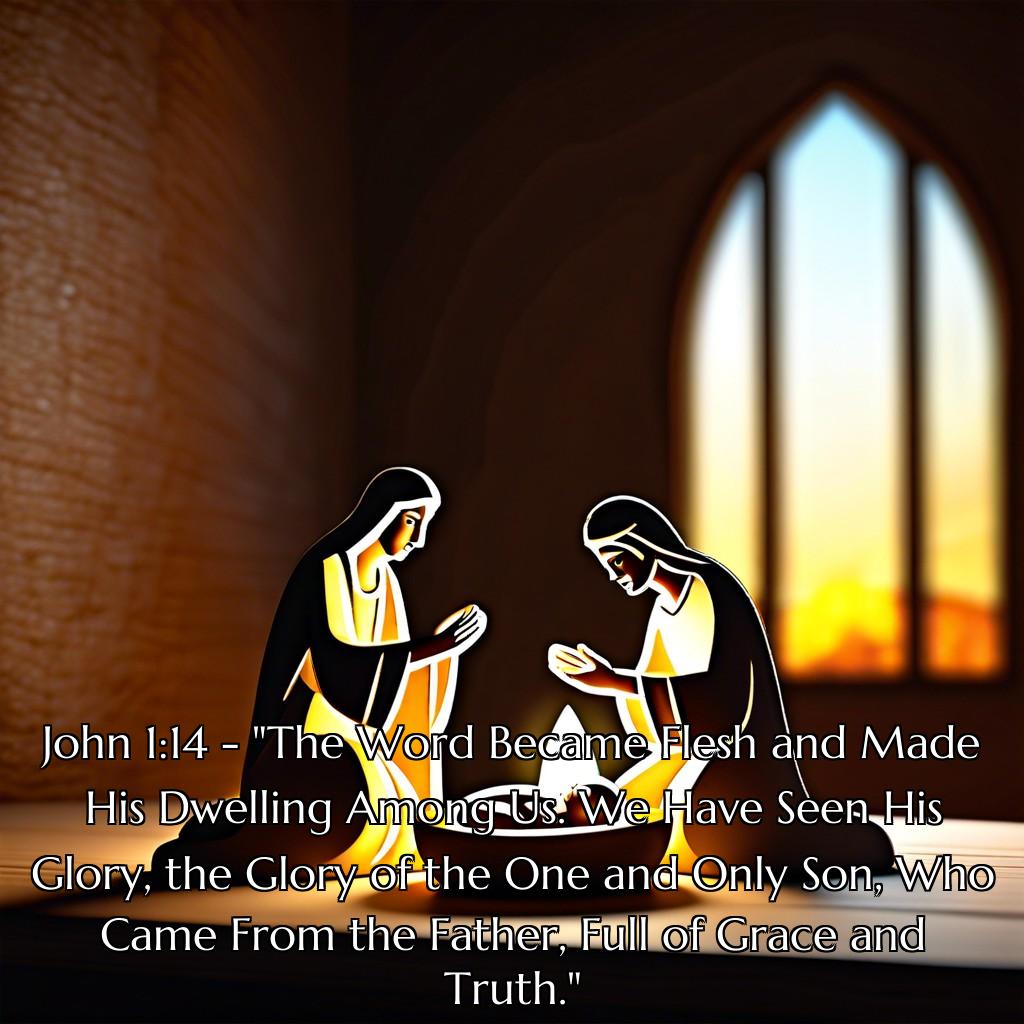
This verse is foundational for understanding the significance of Christmas. It highlights several crucial concepts:
God’s Incarnation: In this moment, God becomes human, bridging the divine and the mortal in the form of Jesus.
Jesus’ Divinity: The verse confirms Jesus as the unique Son of God, embodying divine qualities.
Presence with Us: “Made his dwelling among us” emphasizes that Jesus lived and walked among people, sharing in their experiences and struggles.
Grace and Truth: Jesus brought a perfect blend of grace and truth, offering forgiveness and revealing God’s unwavering truth to humanity.
These points illustrate why Christmas is celebrated—the divine becoming human to bring hope, truth, and grace to the world.
Isaiah 9:6 – “For to Us a Child Is Born, to Us a Son Is Given, and the Government Will Be On His Shoulders. And He Will Be Called Wonderful Counselor, Mighty God, Everlasting Father, Prince of Peace.”
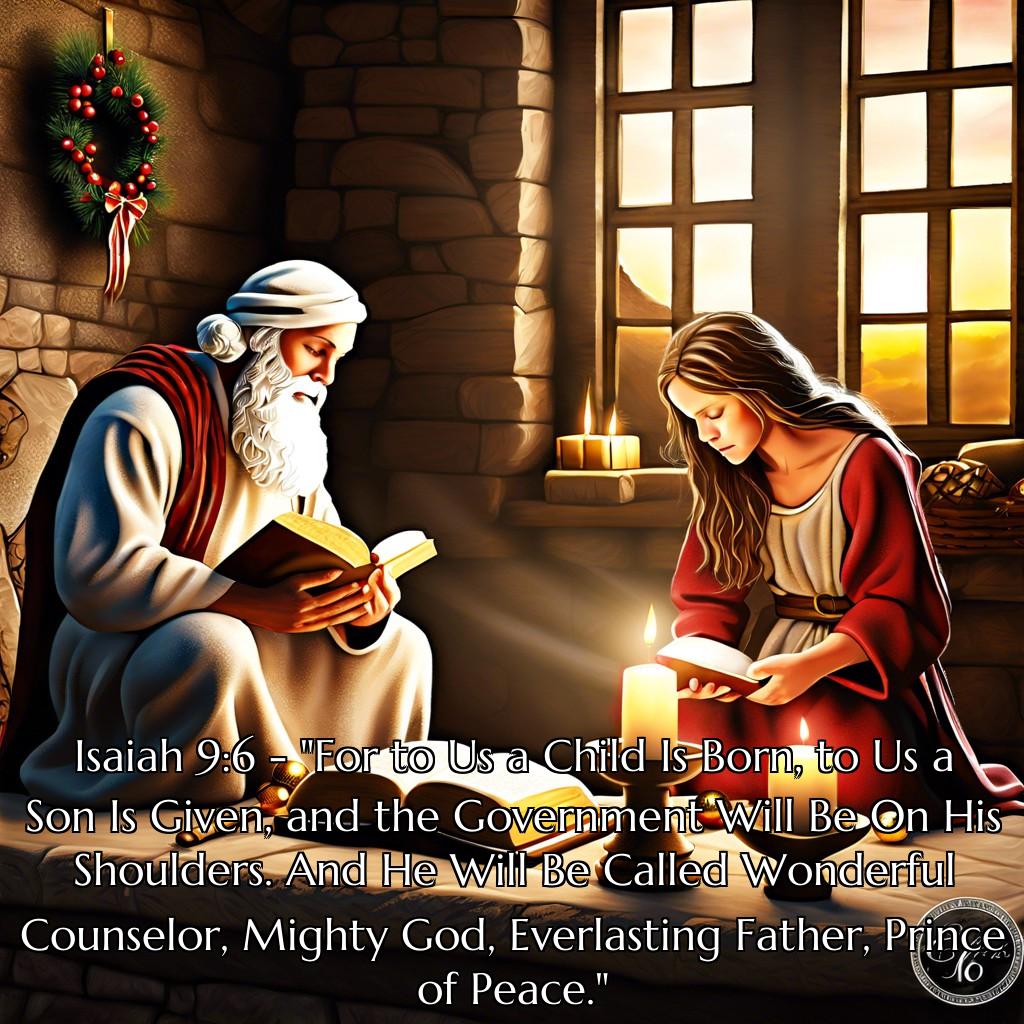
This verse beautifully encapsulates the profound identity and mission of Jesus. Each title given to Him in this passage reveals a unique aspect of who He is and what He offers to humanity.
Wonderful Counselor indicates Jesus’ role as a divine guide who brings wisdom and guidance to those who seek it. He provides clarity in confusion and direction amid chaos.
Mighty God emphasizes His divine nature and power. Jesus is not just a historical figure; He is God incarnate, possessing omnipotence and authority.
Everlasting Father highlights His eternal presence and His fatherly care for believers. Jesus embodies the qualities of a protective, loving parent who will never leave or forsake us.
Prince of Peace signifies that through Him, we find true peace. This is not just the absence of conflict but a profound sense of well-being and harmony with God.
Each title enriches our understanding of Jesus’ profound and multi-dimensional impact on our lives and world.
Matthew 2:11 – “On Coming to the House, They Saw the Child With His Mother Mary, and They Bowed Down and Worshiped Him. Then They Opened Their Treasures and Presented Him With Gifts of Gold, Frankincense and Myrrh.”
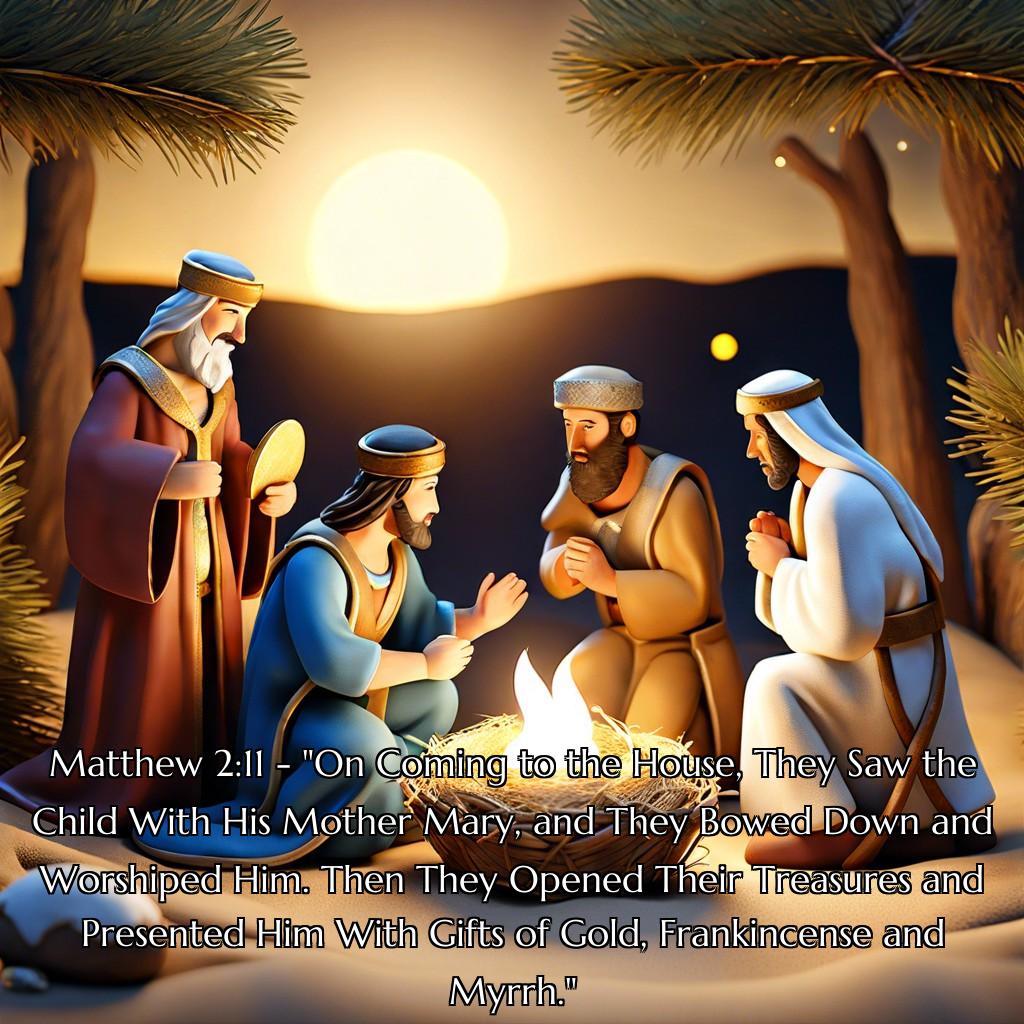
The visit from the Magi, or wise men, brings rich symbolism and meaning. When they found Jesus with Mary, their response was worship, highlighting Jesus’ divine nature and kingship from the very beginning.
The gifts of gold, frankincense, and myrrh are deeply significant:
Gold represents Jesus’ kingship and his royal status.
Frankincense, often used in worship, symbolizes his divine nature and his role as our High Priest.
Myrrh, used in embalming, foreshadows his suffering and death, linking his birth directly to his later sacrifice.
Their act of worship and the symbolic gifts point to the recognition and acknowledgment of Jesus’ unique and divine identity. This scene emphasizes the global and timeless significance of his birth.
John 3:16 – “For God So Loved the World That He Gave His One and Only Son, That Whoever Believes in Him Shall Not Perish but Have Eternal Life.”

This verse beautifully encapsulates the essence of Christmas. The magnitude of God’s love is evident as He gives His one and only Son for the salvation of humanity. It’s a love beyond comprehension, offering eternal life to all who believe.
Key points to consider:
- God’s Love: An unconditional love that includes every person.
- The Gift: Jesus, born to save the world, emphasizing the sacrificial nature of God’s gift.
- Eternal Life: Faith in Jesus leads to everlasting life, an invitation open to everyone.
Understanding this verse heightens the appreciation of the Christmas celebration, focusing on divine love and the promise of salvation.





